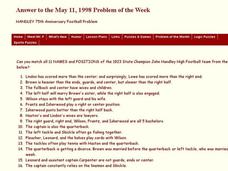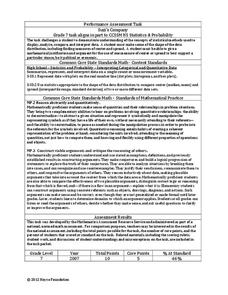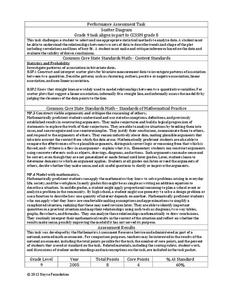Curated OER
Who Lives Where?
In this reasoning worksheet, students read clues about which house each of 6 people live in. Students use reasoning to determine the correct house for each person and label it with the correct name.
Curated OER
Number and Operations- Using Gift Certificates
Students apply number and operation skills to learn how to spend a gift certificate. In this mathematical reasoning lesson, students use base 10 blocks as money and calculate how much money they have.
Curated OER
Best lesson in the whole world!
Students study the concept of fraction using mathematical reasoning. In this problem solving fraction lesson, students use various methods to explain their reasoning in solving fractions. Students use a number of different prompts to...
Curated OER
Track Meet
In this reasoning worksheet, 3rd graders look over a table with statistics and solve the answers to 5 word problems related to the table about a class track meet.
Curated OER
Patterns and Possibilitiies
Learners gain an understanding of the value and importance of patterns in mathematics. Through video, interaction and hands-on activities, students identify concrete and abstract patterns incorporating logic and deductive and inductive...
Curated OER
Multiplying Polynomials
Students explore the concept of multiplying polynomials. In this multiplying polynomials lesson plan, students watch a video clip about basic math skills. Students work in groups on an exploration about why a binomial squared equals a...
Curated OER
Proving Quadrilateral Properties
Working backwards can sometimes help you see a path to solving a problem. In this chapter, properites of quadrilaterials are proven by looking at flowcharts and working the probem backwards. Worked through examples are given, along with...
Curated OER
Mr. P's Life Problem
In this life problem worksheet, students read given facts. Afterward, they use logic and deductive reasoning to determine answers to given questions. This one-page worksheet contains 11 problems. Answers are provided at the bottom of the...
Curated OER
Handley 75th Anniversary Football Problem
In this football worksheet, students read clues and use logic to determine the names of football players. This one-page worksheet contains 16 problems. Answers are provided.
Curated OER
I Have A Friend Who
In this friend worksheet, students use logic and reasoning to determine the characteristics of a person. This one-page worksheet contains 1 problem. The answer is provided.
Curated OER
Four Color Map
Learners explore geometry by completing a color puzzle. In this shape identification lesson, students utilize deductive reasoning to complete a Google SketchUp puzzle with trapezoid, triangles and rectangular shapes. Learners complete...
Curated OER
Proof by Induction
Twelfth graders define and prove theorems using induction. In this calculus lesson, 12th graders differentiate between inductive reasoning and deductive reasoning. They review sigma notations and work proofs by induction.
Curated OER
Preparation and Transition to Two-Column Proofs
Students investigate proofs used to solve geometric problems. In this geometry lesson, students read about the history behind early geometry and learn how to write proofs correctly using two columns. The define terminology valuable to...
Curated OER
Leaf Patterns
First graders explore the existence of patterns in everyday items. In this science and math integrated lesson, 1st graders match leaves with a name word card and organize them into four patterns. This lesson includes a reading of And the...
Curated OER
Puzzle Boxes
In this addition puzzle worksheet, students complete 4 puzzles in which five numbers are placed so that the sum is a specified number in the down and across directions.
Curated OER
Quadrilateral Investigation
A good classroom tool is always great to have around. This tool provides learners with an opportunity to view and investigate the properties of quadrilaterals. Each slide contains images of a square as it is dissected into various...
Inside Mathematics
Party
Thirty at the party won't cost any more than twenty-five. The assessment task provides a scenario for the cost of a party where the initial fee covers a given number of guests. The class determines the cost for specific numbers of guests...
Noyce Foundation
Boxes
Teach your class to think outside the box. Scholars use the concept of equality to solve a problem in the assessment task. They determine how to use a scale to identify the one box out of a set of nine boxes that is heavier than the others.
Inside Mathematics
Suzi's Company
The mean might not always be the best representation of the average. The assessment task has individuals determine the measures of center for the salaries of a company. They determine which of the three would be the best representation...
Inside Mathematics
Scatter Diagram
It is positive that how one performs on the first test relates to their performance on the second test. The three-question assessment has class members read and analyze a scatter plot of test scores. They must determine whether...
Inside Mathematics
Quadrilaterals
What figure is formed by connecting the midpoints of the sides of a quadrilateral? The geometry assessment task has class members work through the process of determining the figure inscribed in a quadrilateral. Pupils use geometric...
Noyce Foundation
Ducklings
The class gets their mean and median all in a row with an assessment task that uses a population of ducklings to work with data displays and measures of central tendency. Pupils create a frequency chart and calculate the mean and median....
Inside Mathematics
Archery
Put the better archer in a box. The performance task has pupils compare the performance of two archers using box-and-whisker plots. The resource includes sample responses that are useful in comparing individuals' work to others.
Inside Mathematics
Rhombuses
Just what does it take to show two rhombuses are similar? The assessment task asks pupils to develop an argument to show that given quadrilaterals are rhombuses. Class members also use their knowledge of similar triangles to show two...

























